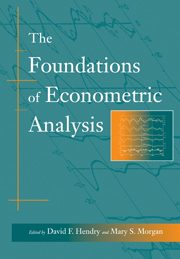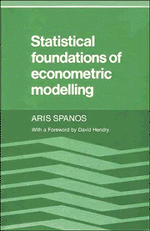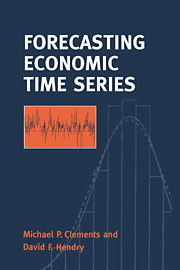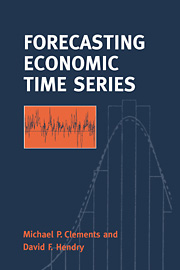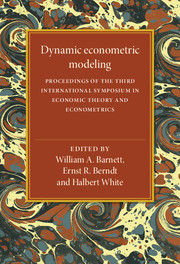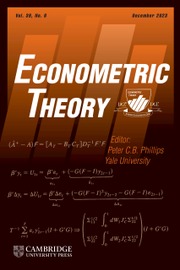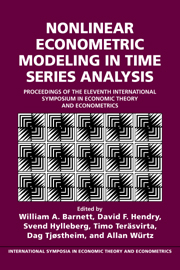The Foundations of Econometric Analysis
In this compelling 1995 book, David Hendry and Mary Morgan bring together the classic papers of the pioneer econometricians. Together, these papers form the foundations of econometric thought. They are essential reading for anyone seeking to understand the aims, method and methodology of econometrics and the development of this statistical approach in economics. However, because they are technically straightforward, the book is also accessible to students and non-specialists. An editorial commentary places the readings in their historical context and indicates the continuing relevance of these early, yet highly sophisticated, works for current econometric analysis. While this book provides a companion volume to Mary Morgan's acclaimed The History of Econometric Ideas, the editors' commentary both adds to that earlier volume and also provides a stand-alone and synthetic account of the development of econometrics.
- Now available in paperback, this book provides easy access to the most important foundational papers in the field of econometrics
- Offers integrated, well-informed editorial commentaries illuminating both the concepts and the applications
- A companion volume to Morgan's successful The History of Econometric Ideas (Cambridge University Press, 1990)
Reviews & endorsements
'Hendry and Morgan assemble in one place the classics of econometric thought. It is required reading for any student of the history of econometrics or anyone interested in the evolution of one body of thinking about how to interpret empirical evidence.' James Heckman, University of Chicago
Product details
February 1997Paperback
9780521588706
576 pages
244 × 170 × 30 mm
0.91kg
83 b/w illus.
Available
Table of Contents
- Introduction
- Part I. The Emerging Role of Econometrics in Economics:
- 1. The scope and method of political economy J. N. Keynes
- 2. Business cycles W. C. Mitchell
- 3. Economic cycles: their law and cause H. L. Moore
- 4. An essay on the nature and significance of economic science L. Robbins
- 5. The common sense of econometrics J. A. Schumpeter
- Part II. Early Time Series Analysis:
- 6. On the study of periodic commercial fluctuations W. S. Jevons
- 7. Correlation of the marriage rate with trade R. H. Hooker
- 8. The correlation of economic statistics W. M. Persons
- 9. Why do we get nonsense correlations between time series? G. U. Yule
- 10. On a method of investigating periodicities in disturbed series, with special reference to Wolfer's sunspot numbers G. U. Yule
- 11. A random difference series for use in the analysis of time series H. Working
- 12. Calculation and elimination of seasonal fluctuations A. Wald
- 13. Morgenstern on economic forecasting A. W. Marget
- Part III. Applied Econometrics and the Identification Problem:
- 14. The elasticity of the demand for wheat R. A. Lehfeldt
- 15. Economic cycles: their law and cause H. L. Moore
- 16. Moore's economic cycles P. G. Wright
- 17. A moving equilibrium of demand and supply H. L. Moore
- 18. Statistical laws of demand and supply P. G. Wright
- 19. Determination and interpretation of supply curves J. Tinbergen
- Part IV. The Evolution of Statistical Thinking in Econometrics:
- 20. Statistical laws of demand and supply with special application to sugar H. Schultz
- 21. 'Pitfalls' debate R. Frisch, W. W. Leontief and J. Marschak
- 22. Statistical confluence analysis by means of complete regression systems R. Frisch
- 23. Linear regression analysis of economic time series T. C. Koopmans
- 24. Statistical testing of business cycle theories J. Tinbergen
- 25. Residual variables in regression and confluence analysis O. Reiersöl
- Part V. Dynamic Models:
- 26. Our unstable dollar and the so-called business cycle I. Fisher
- 27. The notions of horizon and expectance in dynamic economics J. Tinbergen
- 28. Propagation problems and impulse problems in dynamic economics R. Frisch
- 29. Statistical testing of business cycle theories: business cycles in the United States of America 1919–32 J. Tinbergen
- 30. Statistical estimation of economic relationships H. O. A. Wold
- 31. Prolegomena to a pressure-analysis of economic phenomena R. Frisch
- Part VI. The Tinbergen Debate:
- 32. Statistical testing of business cycle theories: a method and its application to investment activity J. Tinbergen
- 33. Professor Tinbergen's method J. N. Keynes
- 34. Mr Keynes on the statistical verification of business cycle theories J. Marschak and O. Lange
- 34. Econometric testing of business cycle research J. Tinbergen
- 35. Autonomy of economic relations R. Frisch
- Part VII. Structure and Simultaneity:
- 36. Economic interdependence and statistical analysis J. Marschak
- 37. The probability approach in econometrics T. Haavelmo
- 38. The statistical implications of a system of simultaneous equations T. Haavelmo
- 39. Statistical estimation of economic relationships H. O. A. Wold
- Part VIII. The Probabilistic Revolution:
- 40. The probability approach in econometrics T. Haavelmo
- 41. 'Measurement without theory' debate T. C. Koopmans, R. Vining, and M. Hastay
- Part IX. Exogeneity:
- 42. When is an equation system complete for statistical purposes? T. C. Koopmans
- 43. Towards partial redirection of econometrics, actions, consequences and casual relations G. H. Orcutt
- Conclusion.

